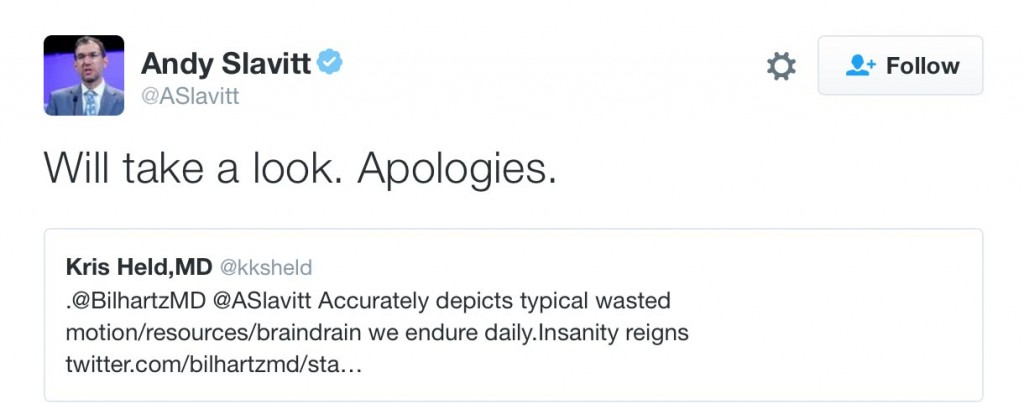My recent post appeared to catch the attention of Mr. Slavitt, Acting Administrator for the Centers for Medicare and Medicaid Services (CMS):
My article recapped another day of insanity within our healthcare enterprise, and yes, taking a look, Mr. Slavitt, would be greatly appreciated.
Choosing to see, however, is my challenge for you—for as a friend reminded me, you seem to be very good at “feeling our pain.”
But, I must admit, thanks to you, I was contacted by a CMS official overseeing the startup of MACRA.
For those that don’t follow healthcare policy closely, MACRA is our government’s latest medical project. Another soon-to-be-implemented healthcare law with 962 pages of rules, including the most recent method devised to pay physicians, something known as the Merit-Based Incentive Payment System (MIPS).
CMS was seeking my perspective on MACRA and MIPS.
My written response to them—edited only somewhat for brevity—is shared below:
Dear _____,
I anticipate that we will fundamentally disagree on what role the government should play when it comes to healthcare. But, I suspect we share many of the same common goals—to improve patient access, affordability, perceived value, system efficiency, and so forth.
I’ve been disappointed with the results of our active administration’s healthcare policies, but it has a chance now to minimize damages by delaying the implementation of MACRA.
If any of our citizens desire more physician choice, lower costs through price competition, less bureaucratic annoyances, and more freedom to decide their own healthcare values, a separate “MACRA pathway” for independent physicians must have time to be created, tested, and proven to yield better outcomes before it’s mandated.
MACRA, as it exists now, is another experimental government rubric that will further cripple individual physicians and smaller group practices—and over 60% of physicians in my state practice in groups comprised of 1-3 doctors. Data from 2014 suggested only about 60% of these smaller practices participated in PQRS, and I contend that even less will participate in MIPS. I will be one of them.
* * *
Marrying (so-called) physician “quality” with reimbursement is an intriguing concept. Yet, it’s more illogical than most assume it to be.
Take, for example, my recent experience at the Home Improvement store. While looking for a product on aisle nine, I was helped by an employee. I pondered a system by which that employee would be reimbursed differently than an equivalent-level worker assisting customers on another aisle. I imagined how one might constantly adjust her hourly wage—using an empirical formula—incorporating immense data collected throughout the customer-employee interaction.
How well did she greet me on aisle nine? How was her customer service? Which terms did she reference in conversation and what product educational material did she select for me? How well did she use the checkout register? Did she recommend the correct item at the best price for my own “do-it-yourself” project? What if I had no interest in doing anything myself anyway? Should she be penalized?
Although a few individuals may view the design of more complex payment strategies to be revolutionary, in practice, there’s a reason why we don’t do it this way. It’s just an incredibly inefficient manner to calculate a salary. The effort required to do these things would be extraordinary. Imagine how much a can of paint would suddenly cost at the store!
* * *
In my office a few hours ago, I saw a patient whose LDL cholesterol level was over 200 mg/dL. He has no known heart disease. Both his parents lived into their tenth decade. He was seeing me for preventive care.
He was a well-educated man, and wanted every bit of data I could provide him. His appointment ran 10 minutes over its scheduled time. I answered all his questions. Ultimately, I recommended that he take a pill. He declined. I’m going to see him back in 6 months. We decided to repeat his LDL level at that time.
Did I do a good job seeing him today?
What will the data I submit surrounding his visit say about me as a physician?
Will I get points for this, or lose points for that?
One of the ironies about this case is that we may understand more about the science of LDL cholesterol than almost anything else in my field of cardiology. Heart disease is society’s number one killer, and LDL was one of the first molecules investigated for an association.
And, yet, we know almost nothing about LDL.
To be honest, we don’t even know if it’s a marker or a disease.
Although I would typically favor health advice contained in medical society guideline statements over government mandates (the former are at least updated more frequently), guidelines still can’t keep pace or nail down what should be done for any individual patient—even for something as straight forward as an LDL level.
For example, you may elect to treat my asymptomatic man with medicine for the purpose of lowering his LDL (current guideline-based care), but you will then struggle to explain why studies actually suggest an inverse relationship between LDL and death—meaning the lower your LDL level, the higher your chance of dying within the next year.
If your foundation of knowledge is built upon this latter interpretation of data, lowering LDL levels becomes no metric for quality at all.
Perhaps an advanced lipid panel (quantifying cholesterol particle size and so forth) might further help us tease out a few of the uncertainties here. Yet, this test isn’t even covered by my patient’s insurance company.
The people there seem to have less incentive to know as much about LDL molecules as I do. Ignorance (in this case) benefits their bottom line, just as having a patient with high cholesterol harms mine, in an arbitrary “pay for value” system.
So, what’s really the government’s role here?
Is it equipped to accurately process these straightforward, yet still complex, medical situations that occur throughout my day?
What about the dozen other more complicated patient encounters I had this morning alone?
Is abstract thinking really the government’s forte?
How will MACRA and MIPS ever be applicable to modern medical practices?
I’m not certain.
I guess that’s your job.
But, a MACRA-created composite physician scoring system—like the one envisioned to coerce our Home Improvement employee—makes so little sense the more you continue to think about it.
You could narrow down the metrics to a handful of generic tasks that everyone is already doing. But, no matter the metrics, MACRA’s proposed scoring system will likely be unable to effectively differentiate 9 out of 10 physicians from one another—much less find the “good” ones.
You could give higher scores to physicians who perform more continuing medical education hours—as if this metric really leads to better care being provided. But, aren’t we just further duplicating what government-issued physician licensure requires already?
MACRA is allocating $100 million dollars to more third parties to “help” small practices “get up to speed” with more rules. But, let’s look at the unseen for just a moment. Where is that money being taken from? I’ll tell you. Patient care.
How does anyone at CMS (or elsewhere) truly believe funding more layers to assist with bureaucratic mimicry is the answer to an already bloated healthcare system?
I would encourage you, instead, to come visit my small practice. Make a trip to 1721 Birmingham Drive. Setup an appointment for yourself or your loved one. Read every word—good and bad—you find about me on the Internet ahead of time.
Then, show up and meet me. Meet my staff. Sit in my waiting room. Ask my other patients what they think. Let me care for you as I was trained to do. Next, write a review. Share your experience.
If I earn at least your partial trust, return a few more times over the ensuing years. Write more reviews. Finally, make a decision and conclude if you think I deserve the 9% bonus payment MACRA intends to provide its highest scoring physicians. Then, go find some other doctor, working somewhere else, that you feel good about stealing his 9%, so you can give it to me. Remember, everything is budget neutral.
You think this is too time consuming? You think this requires too many resources? Nonsense. In fact, you will gain more information about the quality that I provide as a physician in 5 minutes of interacting with me during an office visit, than you will from reviewing a dictionary’s worth of bogus quality metrics.
Why? It’s because I am an independent provider. My name is on the building. Those letters are my practice. It’s all I’ve got.
I’ve worked before within massive institutions. You can hide there. It’s so easy to fail when it comes to someone taking healthy ownership of an individual patient. They frequently get lost in that system.
But, it’s different where I stand. MACRA needs a separate pathway for this kind of thing. In fact, if you come visit me, you might just find MACRA isn’t needed at all.
Sincerely,
RB





